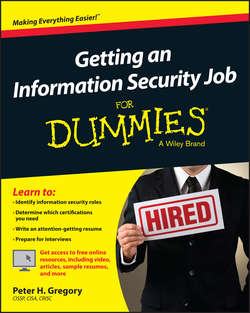Читать книгу Getting an Information Security Job For Dummies - Gregory Peter H. - Страница 3
Introduction
ОглавлениеThe information security (InfoSec) profession got its start decades ago, but it consisted of few people, mostly in military and other secret organizations. With the appearance of the Internet in the 1990s, organizations started to put information online, and the InfoSec profession became a little more popular. Fast-forward to the mid 2010s, with its big security breaches as well as new laws and regulations, and information security is one of the hottest professions around the world.
About This Book
There are more than enough books on information security, but far too few professionals to do the work. Until now, there was no clear guide to getting into the profession. Delivered in the same rich tradition of the Dummies series, Getting an Information Security Job For Dummies is that clear guide on planning your entry in information security, no matter where you are in your career today:
✓ If you're a student or recent graduate, you'll get real-life information on what it’s like in the information security profession.
✓ If you're an experienced IT professional, you'll understand how to make a lateral move into information security.
✓ If you're already getting your start in information security, you can chart your career path and decide what kind of an organization you may want to work in.
✓ If you're in the information security job market, you'll understand different types of information security jobs in different types of organizations.
✓ If you need to hire an information security professional, you'll find lots of information to help you focus on what kind of candidate you need and to better understand the people who are applying for your positions.
No matter why you’re reading this book, you can use it as a security career reference. Getting an Information Security Job For Dummies is full of insight from real information security professionals, in their own voices. You’ll begin to understand what the InfoSec profession is really like from professionals who have been going at it for years.
Foolish Assumptions
While writing this book, I’ve made some assumptions about you:
✓ You are curious about technology and how things work. Even if you're looking to get into the compliance or controls aspect of information security, it’s still important to have a healthy appreciation for how technology supports an organization.
✓ You dislike malware and the criminal organizations that create them. Even if you don’t yet understand how cybercriminals work, your conscience tells you that what they are doing is wrong, and you want to learn how to help organizations better defend themselves.
✓ You enjoy learning. My first clue: You are reading this book! Being in information security – or any branch of information technology – demands continuous learning. Security issues and technology itself change quite rapidly, and continuous learning is needed just to keep up!
✓ You like Dr. Who and his problem-solving capabilities, even if some of the scenarios he finds himself in are a little odd.
How am I doing so far? If all of my assumptions are right, you may be InfoSec material and ready to seriously consider a career in information security.
Icons Used in This Book
Throughout this book, you'll see icons in the left margin that call attention to information that’s worth noting. No smiley faces winking at you or any other cute little emoticons, but you’ll definitely want to take note! Here’s what to look for and what to expect.
Throughout the book, you’ll find stories and tips from information security professionals, in their own voices.
This icon identifies general information and core concepts that are well worth committing to your nonvolatile memory, your gray matter, or your noggin’ – along with anniversaries, birthdays, and other important stuff!
Thank you for reading; we hope you enjoy the book; please take care of your writers! Seriously, this icon includes helpful suggestions and tidbits of useful information that may save you some time and headaches.
Whatever I’m warning you about is nothing that hazardous. These helpful alerts point out easily confused or difficult-to-understand terms and concepts.
Beyond the Book
In additional to the material in the print or ebook you’re reading, this product also comes with more online goodies:
✓ Cheat sheet: The cheat sheet offers tips on interviewing for an information security job and building your personal brand. You can find the cheat sheet at www.dummies.com/cheatsheet/gettinganinformationsecurityjob.
✓ Web extras: You’ll find some great references that you can use, including a resume template, a sample resume, and a list of websites of value to information security professionals. Go to www.dummies.com/extras/gettinganinformationsecurityjob.
✓ Updates to this book, if we have any, are at www.dummies.com/go/gettinganinformationsecurityjobudupdates.
Where to Go from Here
If you're wondering what the information security profession is all about, go to Part I. If you want to dive into the education, training, and knowledge required in information security, start with Part II. If you’re wondering what life is like in different types of organizations, Part III was written just for you. If you’re ready to get out there in the InfoSec job market, go right to Part IV. If you love lists, head for Part V.
And for those who want to take an even deeper dive into the knowledge expected of information security professionals, get a copy of CISSP For Dummies, by Lawrence Miller and Peter H. Gregory.
